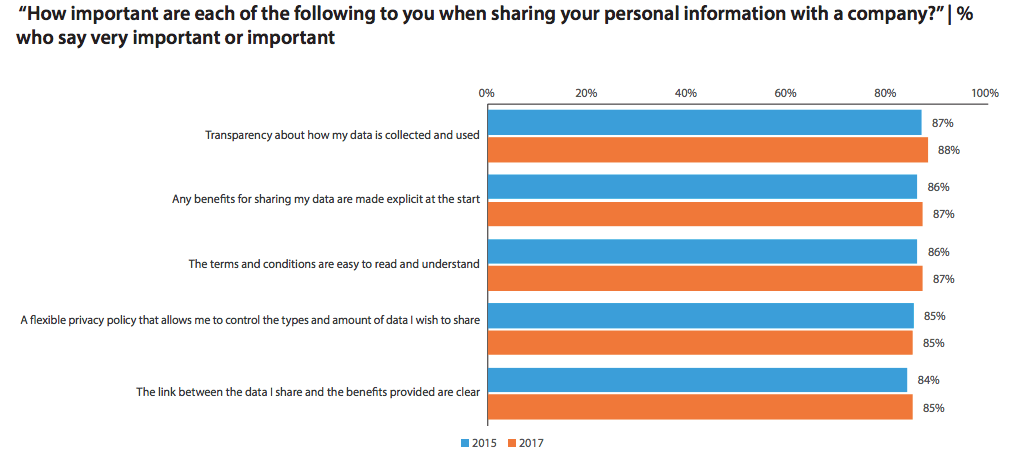119 billion reasons why brands must control their customer data
With growing consumer awareness of data use and misuse comes a heightened responsibility for businesses to safeguard and responsibly manage their customers' information.

In late July, Facebook woke up to the largest one-day loss by any company in the history of the US stock market, dropping $119 billion (roughly one-fifth of its market value) after posting slower-than-expected user growth in its Q2 earnings report.
For those who underestimated the impact of last spring’s Cambridge Analytica data mishandling and the unending accusations of fake news and political interference that now plague the social giant’s brand, I’d say Facebook’s lag in customer growth highlights 119 billion reasons why marketers need to ensure they are in control of their data today.
A reality check
Let’s be honest: what happened with Cambridge Analytica was not so much about Facebook’s wrongdoing, but a reality check on a legitimate marketing practice.
With corporate data breaches increasing and regulatory acts like the General Data Protection Regulation (GDPR), the California Privacy Act and the Trump administration’s impending online privacy proposal dominating headlines, our industry has been thrust into the spotlight — and how brands collect and respect customer data has taken center stage. This serves as a stark reminder to all marketers that our number one responsibility is serving our customers better, not serving more ads. As an industry, we can — we must — do better.
While many brands are already busy implementing consumer privacy safeguards, the fact is that, as marketers, we will still continue to collect and use customer data every day. In today’s data-driven economy, it’s the essence of commercialism.
People freely share personal information to search, transact and interact from anywhere on any device, even with their own voice, in exchange for more personalized and convenient brand experiences. The only thing that’s changed is that consumers are becoming more aware of the cost they are really paying when they do so. How marketers react will be pivotal.
Transparency is key
Which is why now, more than ever, it’s absolutely critical that brands be completely transparent with their collection of consumer data. And they must also maintain ownership and control of this most precious marketing asset. Customer data underpins everything marketers do, and today’s elevated scrutiny of a brand’s data practices actually opens up opportunities to directly interact with consumers and build long-term relationships rooted in mutual trust and mutual benefit.
We already know people are willing to trade personal data for a perceived value. It’s how Starbucks is able to send you a free treat on your birthday. It’s how Waze can alert you to potholes in the road ahead. It’s how Facebook connects you to people you haven’t seen since high school. So why not be completely transparent about the value exchange from the get-go? Let customers know what they are giving up — and what they are getting in return.
Clarity, transparency and trust are the cornerstones of any good relationship, after all. Moreover, customers expect this from the brands with which they engage. In a recent study of consumer attitudes in the UK, three out of four respondents indicated a high concern for online privacy and said it is important that businesses:
- Are transparent about the collection and usage of data.
- Provide easy-to-understand terms and conditions.
- Show a clear link between the data shared and benefits received.
Over half of these same consumers said trusting an organization is the most important factor in sharing data.

Source: Acxiom/DMA UK survey conducted by Foresight Factory in late 2017
Of course, there may be consumers who decide to take a pass on a brand’s value exchange. Yet the new prospects and customers who agree to willingly share their data will now become active, engaged participants in the relationship, equipping marketers with the insights needed to nurture brand loyalty and high lifetime values.
Keep it to yourself
And don’t forget, once customers entrust your brand with their personally identifiable information, it’s yours — and yours alone. Marketers must control who accesses a brand’s data, know exactly what is being done with it and ensure everything is handled in a privacy-compliant way.
When data gets trapped within vendor ecosystems, connections are broken, leaving marketers with partial glimpses of customer behaviors and intents. As a result, marketers can’t possibly engage known individuals with relevancy at strategic stages throughout the customer life cycle, preventing them from delivering the convenience and value that led the customer to give up their information in the first place.
While there are lots (potentially, billions) of lessons to be learned from Facebook’s historic setback, they all lead back to one universal truth: if brands can’t protect their customers, they can’t protect their businesses, either.
Contributing authors are invited to create content for MarTech and are chosen for their expertise and contribution to the martech community. Our contributors work under the oversight of the editorial staff and contributions are checked for quality and relevance to our readers. The opinions they express are their own.
Related stories